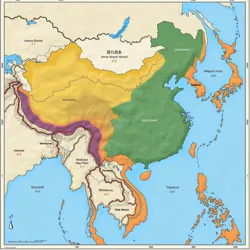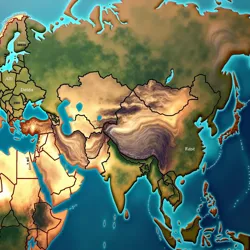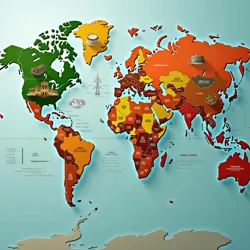21st Century Trans-Murian Relations

Multifaceted interactions between Jade Lands states and the international community in the 21st century, including economic, diplomatic, and cultural aspects.
Trans-Murian Relations
independent kingdoms
Concordian Way
Western Intrusion era
['Liang-Ning', 'Jing-Hua']
['Western Entente', 'Eastern Ascendancy', 'Southern Conglomerate']
21st Century Trans-Murian Relations denote the multifaceted interactions between the diverse states of the Jade Lands and the broader international community in the contemporary era. These relationships are characterized by a complex interplay of economic exchange, diplomatic engagement, cultural dissemination, and strategic considerations, all unfolding against the backdrop of a rapidly globalizing world and the unique historical and cultural context of the Jade Lands. The term "Trans-Murian" itself is a neologism used within Jade Lands academic and diplomatic circles to describe interactions that transcend the historical and geographical boundaries that once largely defined the region's engagement with the world beyond its immediate neighbors. This term evokes a sense of moving beyond perceived or real barriers to forge connections with entities and cultures across the globe.
The Jade Lands, with their rich tapestry of independent kingdoms and the unifying yet diverse spiritual and philosophical underpinnings of the Concordian Way, present a unique case study in international relations. Unlike many regions that experienced consolidation into larger nation-states during the 19th and 20th centuries, the Jade Lands have maintained a system of multiple polities, each navigating its own path in the international arena while simultaneously contributing to a collective regional identity. This internal diversity is mirrored in the external relations of the Jade Lands, which are not monolithic but rather a mosaic of bilateral and multilateral engagements, reflecting the specific interests and priorities of each state as well as broader regional considerations.
Historical Trajectory and Foundations of Modern Relations
The dawn of the 21st century found the Jade Lands at a pivotal juncture in their history of international engagement. The preceding centuries, particularly the 19th and 20th, had been marked by the era of Western Intrusion, a period that compelled Jade Lands states to confront the challenges of modernization and integration into a world system increasingly shaped by external powers. This era, analogous in some respects to the experience of Qing Dynasty China and other Asian nations in our world, forced a re-evaluation of traditional diplomatic and economic practices, spurring internal reforms and a gradual opening to global trade and ideas.
 Western Intrusion era impact on Jade Lands states shaping their modern international engagement and reforms.
Western Intrusion era impact on Jade Lands states shaping their modern international engagement and reforms.The legacy of this period is profound. States like Liang-Ning and Jing-Hua, historically at the forefront of adapting to external pressures, developed relatively robust capacities for international interaction. Liang-Ning, under leaders such as Grand Duke Minzhong, initiated Self-strengthening movements that included studying foreign technologies and diplomatic practices. Jing-Hua, with its long history of maritime commerce, naturally gravitated towards international trade and engagement, establishing early connections with entities far beyond the Jade Lands' immediate periphery.
However, the varied responses to Western Intrusion also contributed to a divergence in foreign policy orientations among the Jade Lands states. While some, like Jing-Hua, embraced international commerce and cultural exchange more readily, others, such as Shu-Han, maintained a greater degree of inward focus, prioritizing internal development and regional equilibrium. This spectrum of approaches continues to shape the trans-Murian relations of the Jade Lands in the 21st century, contributing to the region's complex and nuanced engagement with the world.
The Concordian Way, with its emphasis on harmonious relationships and balanced interactions, also provides a philosophical framework that underpins much of the Jade Lands' approach to international relations. The principles of mutual respect, reciprocal benefit, and the pursuit of concord (協和, Xiéhé) are often invoked in diplomatic discourse and inform the ethical considerations that guide foreign policy decisions. The Mount Hua Holy See, while primarily a religious institution, also plays a subtle but significant role in shaping the moral and ethical dimensions of trans-Murian relations, advocating for peaceful resolution of disputes and the fostering of understanding across cultural and political divides.
Major Global Actors and the Jade Lands
In the 21st century, the Jade Lands states engage with a diverse array of global actors, ranging from major powers and regional blocs to international organizations and non-state entities. These interactions are multifaceted and dynamic, shaped by shifting geopolitical landscapes and evolving global challenges.
 Jade Lands states engaging with global actors such as the Western Entente and the Eastern Ascendancy in various sectors.
Jade Lands states engaging with global actors such as the Western Entente and the Eastern Ascendancy in various sectors.The Western Entente
The "Western Entente," a term used in Jade Lands political discourse to denote a loose association of states primarily located in the western hemisphere and characterized by broadly aligned political and economic systems, represents a significant, albeit complex, partner for the Jade Lands. This Entente, which includes entities analogous to nations in North America and Western Europe in our world, is a major trading partner for many Jade Lands states, particularly Jing-Hua and Wu-Yue, which have robust maritime trade links across the oceans.
Economic relations with the Western Entente are extensive, encompassing trade in manufactured goods, technology, agricultural products, and cultural commodities. Jade Lands exports, including high-quality silks, ceramics, and increasingly, technological components, find markets within the Entente, while Jade Lands states import advanced machinery, consumer goods, and intellectual property. Investment flows are also significant, with Western Entente corporations investing in Jade Lands manufacturing, infrastructure, and technology sectors, and Jade Lands firms gradually expanding their overseas investments, including into Entente markets.
However, relations with the Western Entente are not without points of friction. Differences in political systems and values occasionally lead to diplomatic tensions, particularly concerning issues of governance, human rights, and intellectual property protection. The Western Entente's emphasis on certain universalistic principles sometimes clashes with the more contextual and tradition-rooted approaches prevalent in the Jade Lands. Nevertheless, both sides recognize the mutual benefits of continued engagement, and diplomatic mechanisms exist for managing disagreements and maintaining overall stable relations.
Cultural exchange with the Western Entente is also vibrant. Jade Lands arts, literature, and philosophical traditions, particularly aspects of the Concordian Way, have garnered increasing interest in Entente societies. Educational exchanges, tourism, and people-to-people interactions contribute to a growing understanding, albeit sometimes superficial, between these culturally distinct regions. Universities in Jing-Hua and Yongan, for instance, have established exchange programs with institutions in Entente nations, fostering academic collaboration and cross-cultural learning.
The Eastern Ascendancy
The "Eastern Ascendancy," another term of art in Jade Lands geopolitics, refers to a grouping of powerful states located to the northeast and east of the Jade Lands, sharing geographical proximity and, in some cases, historical and cultural linkages. This Ascendancy, bearing resemblance to entities like China and Russia in our world, is a crucial strategic and economic partner for the Jade Lands, particularly for northern states like Liang-Ning and Yan-Zhao.
Economic ties with the Eastern Ascendancy are deepening, driven by geographical proximity, shared infrastructure projects, and complementary economic structures. Cross-border trade, particularly overland trade through Liang-Ning and Yan-Zhao, is substantial, involving energy resources, raw materials, manufactured goods, and agricultural produce. Jade Lands states are increasingly integrated into Ascendancy-led regional economic initiatives, such as infrastructure development corridors and free trade zones, seeking to leverage geographical advantages and access to large and growing markets.
Politically, the relationship is characterized by strategic alignment on many regional and global issues. Both the Jade Lands and the Eastern Ascendancy share an interest in maintaining regional stability, countering transnational threats, and promoting a multipolar world order. Diplomatic coordination is frequent, particularly within multilateral forums and regional security frameworks. However, historical sensitivities and lingering border issues occasionally present challenges, requiring careful diplomatic management and ongoing dialogue.
Cultural connections between the Jade Lands and the Eastern Ascendancy are historically deep and continue to evolve in the 21st century. Shared cultural roots, linguistic affinities in some border regions, and the historical influence of philosophical traditions that predate the Concordian Way contribute to a sense of cultural proximity. Cultural exchanges, tourism, and media flows further reinforce these connections, although distinct national identities and cultural trajectories ensure that these interactions are not simply a matter of cultural convergence but rather a complex interplay of shared heritage and divergent paths.
The Southern Conglomerate
The "Southern Conglomerate," a less formally defined grouping, encompasses states to the south and southeast of the Jade Lands, often characterized by rapidly developing economies, diverse cultures, and a growing presence on the global stage. This Conglomerate, analogous to nations in Southeast Asia and the Indian subcontinent in our world, represents an increasingly important economic and diplomatic partner for the Jade Lands, especially for coastal states like Minyue and Wuyue.
Economic relations with the Southern Conglomerate are expanding rapidly, driven by trade, investment, and growing economic interdependence. Maritime trade routes connecting Jing-Hua, Minyue, and Wuyue with ports in the Conglomerate are bustling, facilitating the exchange of manufactured goods, raw materials, agricultural products, and energy resources. Jade Lands states are increasingly seeking investment and economic partnerships within the Conglomerate, recognizing the dynamism of these economies and the potential for mutually beneficial collaborations.
Diplomatically, the relationship is characterized by generally positive and cooperative interactions, often focused on regional economic integration, maritime security, and cultural exchange. Jade Lands states and Conglomerate nations often share common positions on issues such as multilateralism, sustainable development, and regional connectivity. However, overlapping maritime claims and occasional resource competition in the South Jing Sea (南景海, Nán Jǐng Hǎi), the body of water to the south of Jing-Hua, can create points of tension requiring diplomatic resolution.
Cultural connections between the Jade Lands and the Southern Conglomerate are historically significant, dating back to ancient trade routes and cultural diffusion. Influences from Jade Lands culture, including elements of the Concordian Way, can be traced in some Conglomerate societies, while conversely, cultural practices and commodities from the south have long been integrated into Jade Lands life. Contemporary cultural exchange, tourism, and migration patterns further enrich these connections, contributing to a diverse and evolving intercultural landscape.
The Western Islamic Polities
Relations with the Islamic polities to the west of the Jade Lands, including entities like the Samarkand Sultanate and the Ferghana Khanate, represent a particularly complex and historically laden dimension of trans-Murian relations. These interactions are shaped by geographical proximity, shared historical trade routes like the Silk Roads, and significant cultural and religious differences.
Economic exchange remains a crucial aspect of this relationship. Cross-border trade, facilitated by historical caravan routes and modern infrastructure, continues to be significant, involving commodities such as textiles, agricultural products, minerals, and energy resources. Jade Lands states, particularly Jin-Wei and Shu-Han which are geographically closest to the western polities, engage in active trade and economic cooperation, recognizing the mutual benefits of cross-border commerce.
However, historical tensions and cultural and religious divergences continue to shape the political and security dimensions of this relationship. Border disputes, occasional cross-border security incidents, and differing approaches to regional stability present ongoing challenges. Religious and cultural differences, while not necessarily a source of conflict in themselves, can sometimes be politicized or exploited, leading to misunderstandings and tensions. The Treaty of Heavenly Mountains established a formal border centuries ago, but the dynamics of cross-border populations and historical grievances require careful management.
Cultural exchange with the Western Islamic Polities is a delicate but important aspect of trans-Murian relations. While religious differences are pronounced, there are also shared cultural elements stemming from historical interactions along the Silk Roads and broader Eurasian cultural zones. Academic exchanges, cultural festivals, and people-to-people initiatives aim to foster understanding and bridge cultural divides, recognizing the importance of dialogue and mutual respect in managing a complex and historically sensitive relationship. The Trans-Murian Relations Institute (穆境關係研究所, Mùjìng Guānxì Yánjiū Suǒ), a newly established academic center in Yongan, is dedicated to studying and promoting informed engagement with the Western Islamic polities.
Multilateralism and Regional Cooperation
Jade Lands states are increasingly active participants in multilateral institutions and regional cooperation frameworks, recognizing the importance of collective action in addressing global challenges and promoting regional stability.
Within the framework of pan-Asian cooperation, Jade Lands states are prominent members of initiatives such as the Pan-Asian Harmony Initiative (泛亞和諧倡議, Fàn Yà Héxié Chàngyì), a regional forum focused on promoting economic integration, cultural exchange, and security cooperation among Asian nations. This initiative, while still evolving, provides a platform for Jade Lands states to engage collectively with other Asian nations on issues of shared concern, fostering regional dialogue and consensus-building.
Jade Lands states also participate in global organizations, including entities analogous to the United Nations and various international economic and cultural bodies. They contribute to global initiatives on issues such as climate change, sustainable development, and pandemic response, seeking to play a responsible and constructive role in the international community. The Yongan Declaration on Global Concord (永安全球協和宣言, Yǒng'ān Quánqiú Xiéhé Xuānyán), issued in 2022, articulates a Jade Lands vision for a more harmonious and cooperative international order, drawing upon the principles of the Concordian Way to advocate for peaceful coexistence and mutual benefit among nations.
Economic Interdependence and Global Trade
Economic relations are a cornerstone of 21st-century trans-Murian relations. Jade Lands states are deeply integrated into the global trading system, participating in international value chains and engaging in extensive trade with partners across the world.
 Jade Lands deeply integrated into the global trading system, participating in trade, services, and international investment.
Jade Lands deeply integrated into the global trading system, participating in trade, services, and international investment.Trade in goods remains a major component of economic interactions. Jade Lands exports include manufactured goods, such as electronics, machinery, textiles, and ceramics; agricultural products, such as rice, tea, and fruits; and natural resources, such as minerals and timber. Imports encompass energy resources, raw materials, advanced technology, and consumer goods. Major trading partners include states in the Western Entente, Eastern Ascendancy, Southern Conglomerate, and, to a lesser extent, the Western Islamic Polities.
Services trade is also growing in importance, particularly in sectors such as tourism, finance, education, and cultural industries. Jing-Hua and Yongan are emerging as regional hubs for financial services and tourism, attracting international businesses and visitors. Educational institutions across the Jade Lands are increasingly offering programs to international students and engaging in cross-border research collaborations.
Investment flows, both inward and outward, are significant. Jade Lands states attract foreign direct investment in sectors such as manufacturing, infrastructure, technology, and services, seeking to leverage external capital and expertise for economic development. Conversely, Jade Lands firms, particularly those based in Jing-Hua and Liang-Ning, are gradually expanding their overseas investments, seeking to access foreign markets, resources, and technologies.
Cultural Dissemination and Soft Power
Cultural exchange and the projection of soft power are increasingly recognized as important dimensions of trans-Murian relations. Jade Lands states are actively engaged in promoting their cultures and values on the global stage, seeking to enhance their international image and build bridges of understanding with other societies.
Jade Lands cultural exports, including traditional arts such as calligraphy, painting, opera, and martial arts, as well as contemporary cultural products such as films, music, and fashion, are gaining international recognition and appreciation. Cultural festivals, art exhibitions, and performing arts tours showcase the richness and diversity of Jade Lands cultures to global audiences.
Tourism plays a crucial role in cultural dissemination and people-to-people diplomacy. Jade Lands states actively promote tourism, highlighting their historical sites, natural landscapes, and unique cultural experiences. Inbound tourism brings international visitors to the Jade Lands, fostering cultural understanding and economic benefits, while outbound tourism allows Jade Lands citizens to experience and learn from other cultures.
Educational and academic exchanges are also vital for cultural soft power. Jade Lands universities attract international students and scholars, creating networks of cross-cultural understanding and intellectual collaboration. Language and cultural centers are established in foreign countries to promote the study of Jade Lands languages and cultures, further disseminating cultural influence and building people-to-people connections.
Security Challenges and Geopolitical Balancing
The 21st century presents a complex security landscape for the Jade Lands, requiring careful geopolitical balancing and proactive engagement in regional and global security initiatives.
Regional security concerns include border disputes, maritime security in the South Jing Sea, and the management of relations with neighboring powers. Jade Lands states prioritize peaceful resolution of disputes, diplomatic dialogue, and regional cooperation mechanisms to maintain stability and prevent escalation of tensions. Military modernization efforts are underway in several states, primarily focused on defensive capabilities and maintaining regional equilibrium.
Transnational security threats, such as terrorism, cybercrime, and pandemics, pose shared challenges requiring international cooperation. Jade Lands states actively participate in international counter-terrorism efforts, cybersecurity initiatives, and global health security frameworks, recognizing the need for collective action to address these borderless threats.
Great power competition and shifting geopolitical alignments present a complex external environment for the Jade Lands. Navigating relations with major global powers, maintaining strategic autonomy, and avoiding entanglement in great power rivalries are key foreign policy objectives. Jade Lands states generally pursue a policy of non-alignment and diversified partnerships, seeking to maintain balanced relations with all major actors and avoiding over-reliance on any single power bloc.
Future Trajectories and Evolving Dynamics
The trans-Murian relations of the Jade Lands are poised for continued evolution and deepening engagement in the 21st century. Several key trends are likely to shape the future trajectory of these interactions.
Economic interdependence will continue to grow, driven by globalization, technological advancements, and the expanding global marketplace. Jade Lands states will further integrate into global value chains, participate in regional economic integration initiatives, and seek to leverage international trade and investment for sustained economic growth and development.
Cultural exchange and soft power will become increasingly important instruments of foreign policy. Jade Lands states will invest further in cultural diplomacy, educational exchanges, and public diplomacy initiatives to enhance their international image, build cultural bridges, and promote mutual understanding. The Concordian Way, with its emphasis on harmony and balanced relationships, may increasingly be presented as a philosophical contribution to global dialogue and intercultural understanding.
Geopolitical complexities and security challenges will remain significant. Jade Lands states will need to continue to navigate a multipolar world, manage regional tensions, and address transnational security threats through a combination of diplomatic engagement, regional cooperation, and measured security preparedness. Maintaining regional stability and promoting peaceful resolution of disputes will remain paramount.
The unique political structure of the Jade Lands, as a mosaic of independent states within a shared cultural and spiritual space, will continue to shape its trans-Murian relations. The diversity of perspectives and approaches among the Jade Lands states, while sometimes presenting challenges, also offers a richness and adaptability that can be valuable in navigating a complex and rapidly changing world. The collective engagement of the Jade Lands with the international community will likely continue to be characterized by a nuanced and multifaceted approach, reflecting both the individual interests of its constituent states and the shared heritage and aspirations of the region as a whole.